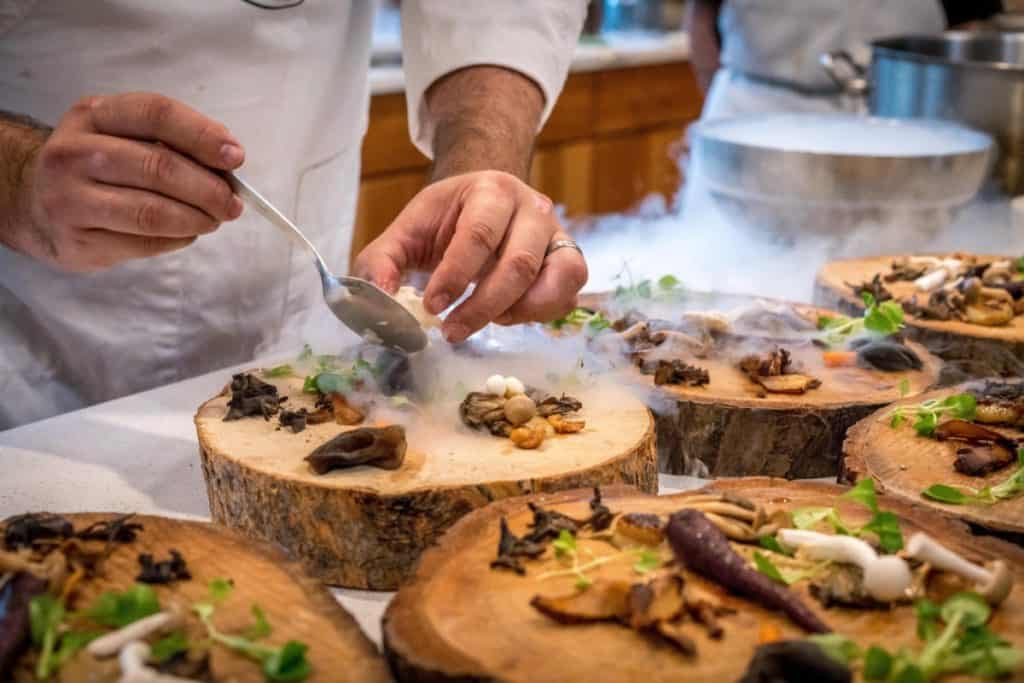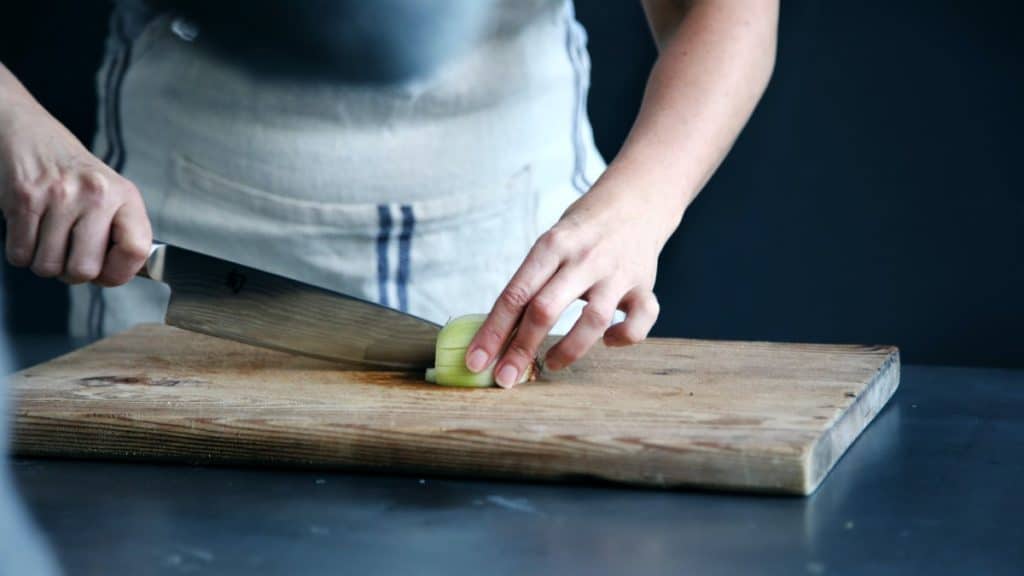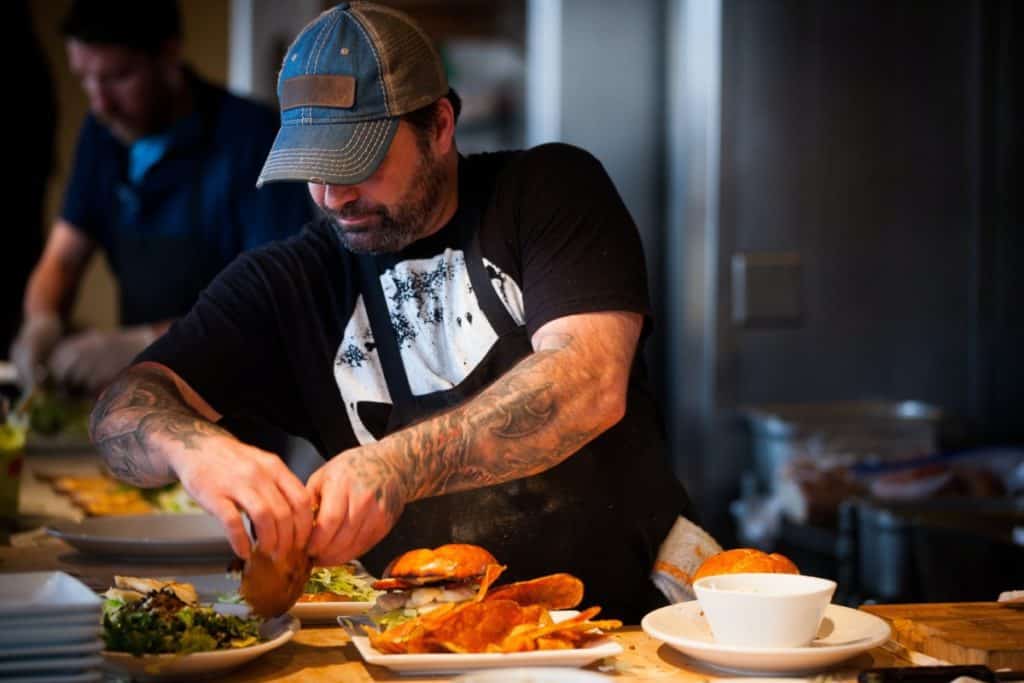
For all of the challenges a new chef has to face, believe it or not, the challenge of learning to cook is actually one of the easier obstacles to overcome.
has to face, believe it or not, the challenge of learning to cook is actually one of the easier obstacles to overcome.
Many would be chefs ask, is cooking hard to learn? And how to make cooking easier?
Fortunately, learning to cook is easy. It is simply a process of establishing the basic skills and foundations, then building upon these to the point where cooking becomes fun and enjoyable.
In this article we will look at 7 reasons why, as a chef, I believe cooking to be a skill anyone can easily learn, whether in a professional kitchen or a keen amateur at home.
After reading I believe anyone will have a much better understanding of the starting blocks to becoming a great chef and how to make cooking much easier!
1. There’s A Structured Process
Learning a new skill is a lot easier when we follow a set system, and cooking is no exception.
If we tried to learn guitar, we would start by learning the basic notes, then the chords, then build up to a complete song. (I assume this is how it works as I don’t have a musical bone in my body!)
We would not pick up a guitar and expect to be able to play a full song instantly. Weirdly however, this is what a lot of people expect to happen when cooking.
They dive head first into a new recipe without ever taking the time to learn the basics in advance. It is a testament to peoples creativity and the ease of cooking that we get results this way at all.
in advance. It is a testament to peoples creativity and the ease of cooking that we get results this way at all.
2. Knife Skills Are Easy To Learn
As beginner chefs , we are shown basic knife skills and have the opportunity to practice over and over again. The great thing about this is that by the end of our first week we are far more proficient with a knife – it’s that quick!
, we are shown basic knife skills and have the opportunity to practice over and over again. The great thing about this is that by the end of our first week we are far more proficient with a knife – it’s that quick!
As a Chef progresses we soon discover that knife speed comes naturally. Once we are using a knife proficiently it becomes almost a game to see how quick we can chop that bag of carrots or prepare those potatoes.
we soon discover that knife speed comes naturally. Once we are using a knife proficiently it becomes almost a game to see how quick we can chop that bag of carrots or prepare those potatoes.
The other great advantage of building a solid foundation of knife skills is that it frees up our brain to focus on the cooking. By automating the chopping process our minds can focus on the rest of the preparation and the important skill of multitasking becomes far easier.
This gives the impression of a chef at ease which is a surprisingly easy state to achieve with the smallest amount of practice.

3. Basic Techniques Have Multiple Uses
Cooking is based on fundamentals that are built upon. Fortunately these fundamentals are surprising straightforward to learn and are used in a surprising amount of dishes.
When starting on your cooking journey you will quickly learn the basics. Roux, mirepoix, searing meats, blanching veg, pastry essentials. These are all examples of the building blocks that have many uses.
you will quickly learn the basics. Roux, mirepoix, searing meats, blanching veg, pastry essentials. These are all examples of the building blocks that have many uses.
For example, once you can make a roux, you have the understanding of how to make a béchamel (white sauce, which is essentially milk added to a roux to thicken it.) and an understanding of how to thicken any sauce or stew.
Next time you find yourself ladling a thin casserole or getting frustrated with your watery gravy, you will know how to thicken it from that one simple basic . All your dishes now get a lift!
. All your dishes now get a lift!
4. Speed Comes Naturally
The more we cook, essentially practicing a skill, the faster we become at it. Whilst speed may seem like a more advanced perk, it is in fact a fundamental part of cooking becoming easy.
As a chef in a professional kitchen , speed is essential. The pace and flow of the service is dictated by the head chef
, speed is essential. The pace and flow of the service is dictated by the head chef  so it is important that we can keep up!
so it is important that we can keep up!
Speed is also really useful for home cooks. When we are able to whip up a meal in 30 minutes or less, we are far more likely to want to cook after a busy day at work. This becomes a helpful cycle whereby the more we choose to cook, the better we get.
There are no real techniques that I would encourage to gain speed. I feel it is a natural progression from gaining confidence and practicing the basic knife skills which we talked about earlier.
5. Simple Can Be Delicious
I believe many people find cooking hard as their only real experience is trying to run before they can walk.
A common scene is an enthusiastic, if inexperienced cook, deciding they are going to surprise their other half with a romantic three course valentines meal at home.
What starts off with visions of a romantic gastronomic experience often becomes a cobbled together chaotic evening (even if this is fun anyway!) After the ordeal the well-intentioned cook declares that they ‘can’t cook and never will again!”
Those less experienced in the kitchen fail to realise that the best dishes are the ones combining great ingredients with simple cooking.

I have definitely been guilty, especially in my early chef career , of wanting to do all sorts of elaborate fashioning to the ingredients. I was obsessed with cooking dishes several different ways, making elaborate terrines or deconstructing a dish.
, of wanting to do all sorts of elaborate fashioning to the ingredients. I was obsessed with cooking dishes several different ways, making elaborate terrines or deconstructing a dish.
As I progressed I realised the best dishes are the ones that are simple and executed well. Yes, there is a time and a place for a Heston Blumenthal
I realised the best dishes are the ones that are simple and executed well. Yes, there is a time and a place for a Heston Blumenthal inspired foam, but our first few attempts at cooking may not be the best time to try.
inspired foam, but our first few attempts at cooking may not be the best time to try.
Next time you want to cook a special meal, I would advise that you go to the butcher and get a good cut of meat (perhaps a fillet steak) Next, pick up some potatoes, mushrooms and green beans from the veg stand. What you now have are ingredients which are simple to cook and that will result in a great meal guaranteed every time.
Even professional chefs often need reminding to keep dishes simple . Buying the best quality ingredients saves huge amounts of time at the preparation stage because the ingredients can speak for themselves.
. Buying the best quality ingredients saves huge amounts of time at the preparation stage because the ingredients can speak for themselves.
6. Menu Planning Is Key
This is an important point for professional chefs as well as for cooks at home. The way we plan the menu is essential for making the cooking process as easy as possible.
Designing a menu that allows for dishes to be prepared and cooked well in advance has a huge advantage when it comes to service time. This is an important part of the Sous chef  and head chefs
and head chefs job.
job.
Here’s an example of what we are talking about when selecting veg to accompany a roast dinner.
- We can choose boiled carrots, broccoli, green beans and peas. However the problem is that these are all choices which take different lengths of time to cook and are all fighting for space on the stove top.
- Instead, if we choose to do roasted carrots (can be placed in the oven and forgotten about for a long time), braised red cabbage (can be cooked the day before and re-heated for service), cauliflower cheese (another dish that can be prepped in advanced and cooked in the oven, and peas (a quick 5 mins in boiling water and done).
- In the second menu we have removed much of the last minute work. Utilising the oven gives us a larger margin for error and these dish options allow much of the prep work to be done well in advance.
In a professional kitchen we would simply keep the braised cabbage warm during service and serve up portions as required. Far easier than cooking all the veg to order and no quality or flavour sacrificed in the process!
7. Cooking Is A Process To Enjoy
To end, we should try and remember that cooking is a process to be enjoyed . It is not all about the end result.
. It is not all about the end result.
Professional chefs enjoy the process of learning and experimenting with food, there is never a point where you can say, ‘that’s it I’ve learnt it all.’
It can be difficult after a busy day to enjoy cooking, but when we relax into it we often find it is actually a really therapeutic process for winding down.
Our friends in Europe understand the joys of leisurely evening meals and taking time to cook and enjoy food for the experience that it is.
When cooking is seen as a chore to be done before getting on with other more important things, we are always going to struggle to enjoy it.
When we make time to be in the kitchen, perhaps chatting over a glass of wine whilst preparing dinner, it enhances the experience. The great meal we enjoy as a result becomes just a small part of a wonderful relaxed evening.
